|
Printables |
PowerPoints |
Online exercises |
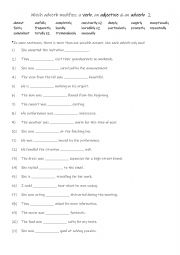
|
Which adverb modifies a verb, an adjective & an adverb 2
First, students need to familiarise themselves with the 21 adverbs and their meanings. Then they read the sentences to see which one is required to complete the gap-fill. Additionally, recognising whether it modifies a verb, an adjective & an adverb. Each type is modified 8 times! Answers on page 2.
Level: elementary
Age: 8-100
Type:
Downloads: 129
|
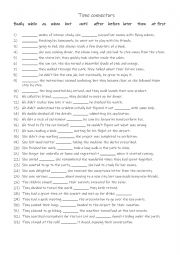
|
A2+-B1 11 Time connectors:finally,while,as,when,but,until,after,before,later,then & at first
Students read the sentences and complete the gap-fill with a suitable time connector. Each conjunction is used 3 times. Answers on page 2.
Level: intermediate
Age: 8-100
Type:
Downloads: 114
|
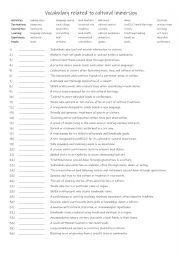
|
A2+-B1 Vocabulary for cultural immersion
Students familiarise themselves with the 30 words and their meanings, then they read the definitions to work out and write in the space provided which one is being described. Answers on page 2.
Level: intermediate
Age: 10-100
Type:
Downloads: 104
|
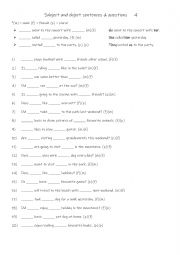
|
Subject and object sentences & questions 4
Students complete the subject and object sentences & questions using the following key: *(m) = male (f) = female (p) = plural. Answers on page 2.
Level: elementary
Age: 8-100
Type:
Downloads: 108
|
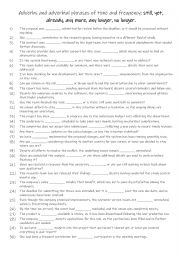
|
B1+-B2 Adverbs and adverbial phrases of time and frequency still, yet, already, any more, any longer, no longer.
These adverbs and phrases help students describe actions, events, and situations with greater detail, making their language more engaging and nuanced. Language proficiency tests often include questions that require understanding and using these adverbs correctly, so practicing them can improve exam performance. Understanding and using these adverbs...
Level: intermediate
Age: 12-100
Type:
Downloads: 132
|
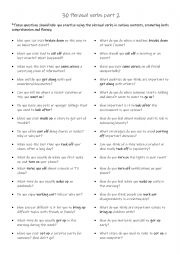
|
30 Phrasal verbs part 1 b
This is a speaking reinforcement activity for the phrasal verbs in Part 1 A. It contains 2 questions for each of the 30 phrasal verb. Suitable for pair work or small groups.This worksheet is suitable for CEFR A2-B1 level students.
Level: elementary
Age: 10-100
Type:
Downloads: 109
|
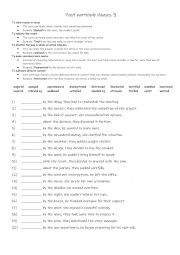
|
A2-B1 Past participle clauses 3
Students complete the gap-fill with the correct word. Answers on page 2.
Level: elementary
Age: 8-100
Type:
Downloads: 114
|
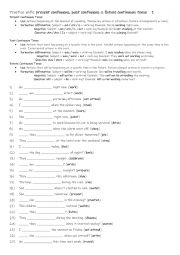
|
A1+-A2 Practise with present continuous, past continuous & future continuous tense 1
Learning the Present Continuous, Past Continuous, and Future Continuous tenses is crucial for effective communication, as they allow students to describe ongoing actions, provide context to events, and discuss future plans. These tenses help express temporary actions, describe interruptions, and improve storytelling by adding detail and specificity...
Level: elementary
Age: 8-100
Type:
Downloads: 114
|
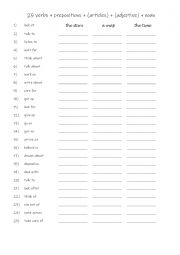
|
Collocations - 25 verbs + prepositions + (articles) + (adjective) + noun
Overall, mastering verbs + prepositions (and related word combinations) can significantly improve your language skills, making you a more effective communicator in both spoken and written contexts.Using collocations correctly makes your language sound more natural and fluent. Native speakers often use specific combinations of verbs, prepositions, a...
Level: intermediate
Age: 10-100
Type:
Downloads: 120
|
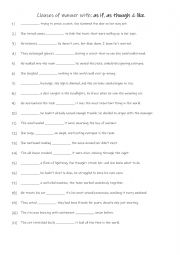
|
B1+-C1 Clauses of manner with: as if, as though & like.
Clauses of manner describe the way in which an action is performed. They often answer the question "how?" and are introduced by expressions like "as if," "as though," and "like."
"As if" and "as though" are typically used to describe a situation that is hypothetical or imagined. They can be followed by a verb in a past or present tense:
Past tens...
Level: advanced
Age: 12-100
Type:
Downloads: 122
|
|
|
|
|












